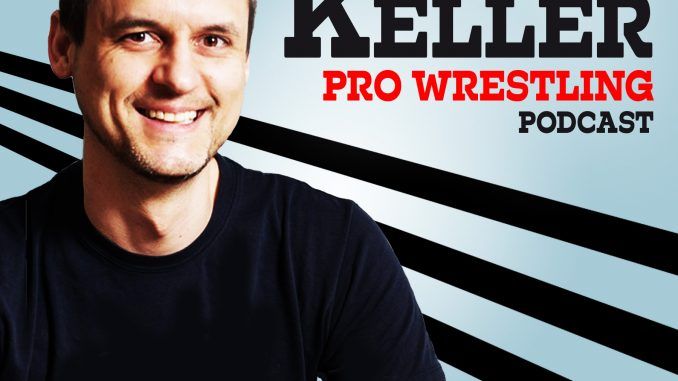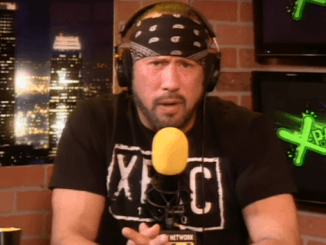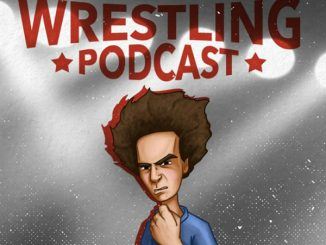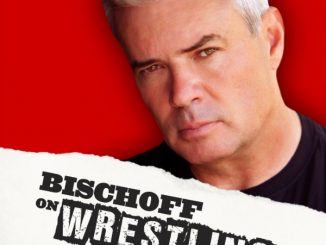
Wade Keller Pro Wrestling Podcast – Interview Friday
Release Date: November 3, 2017
Guest: Dave Lagana
Recap by: Jason Darling
DIRECT LINK TO LISTEN/DOWNLOAD
Newsworthy Items:
- Originally, TNA was supposed to be “Tuesday Night All-Stars.”
- Production and writing style is exactly the same as it was in 2002, nothing has changed in WWE.
- Dave and Billy supposed to do an episode on his “Infamous” podcast from 2011. He signed with TNA two days before the interview was to happen and it got canceled.
- June 14th, 2016, TNA tried airing an episode on Pop TV, only to be met with a loop of commercials and broken segments. It still managed to pull 180,000 viewers.
- Dave foresees the Wrestling Industry being flipped on its ear in the next 9-18 months.
Intro:
The letters “NWA” mean different things to different people. For older fans, it was the top rival to the WWF in the late 1980’s. It may also bring memories back to longtime fans of their regional territory. It was the main territory that Ric Flair headlined during the beginning of his career. NWA is closer to NJPW and Bullet Club in today’s landscape. NWA was more for wrestling purists and hardcore fans and WWF was more focused on entertainment with putting pumpkins on wrestlers heads, etc. The NWA morphed into WCW, then went under and the NWA turned to regional promoters and was used more locally.
NWA-TNA was the first reemergence of the NWA name back in the early 2000’s when Jerry Jarrett thought using the name would have a lot of drawing power. Originally they planned on having PPV’s that aired on Tuesdays, but WWF Coliseum Videos had exclusive rights to Tuesday night PPV’s and it was moved to Wednesdays. Jarrett called Wade to tell him the new name and abbreviation, Total Nonstop Action/TNA, to which Wade rolled his eyes. Eventually, they gave up on the NWA part and went to just TNA. NWA went back to being a regional namesake used for a few small promotions.
Billy Corgan’s Emergence:
Billy Corgan came in and purchased the rights to the NWA name. Before that, he wanted to buy TNA, but that fell through. NWA right now is just YouTube videos and a few press conferences, but that will change next year. There will now be a weekly free show available online starting next year.
Dave Lagana is Billy Corgan’s top assistant and is today’s guest. Dave has been a part of just about every promotion, working in creative, and not for short stays. He was around for about five years in each major organization. Dave was a subscriber to the PWTorch newsletter back in the day before he made it into the business.
Part 1 of the interview, this week’s show, is about his journey getting into the business. Part 2 which will air next week is going to be more about his time in the business, what he has learned, how it shapes his thought process with NWA, and current thoughts on the product. This show will provide good insight into what we can expect from the NWA and what it could mean for the future of the business.
Breaking News:
There’s breaking news from the Thursday flagship show to the interview being released today, which is AJ Styles getting a World Title opportunity against Jinder Mahal next week on Smackdown Live. Originally he was supposed to face Rusev for a spot in the Survivor Series elimination tag match. It gives hope to a lot of fans that maybe the PPV main event will become Lesnar vs. AJ Styles. Wade then plugs going to PWTorch where he will be talking all about it on his hotline.
Interview Start:
Wade introduces Dave Lagana as the Vice President of the National Wrestling Alliance. Dave says that he and Wade have never actually spoken before, though they’ve had correspondence through email. He brings up being a subscriber to the PWTorch newsletter and says this has been a long time coming for him. Wade says Dave had the perception of being a Hollywood type. WWE was looking for new writers and brought Dave in. He was writing for Friends at the time and this appealed to Vince, who was looking to bring in Hollywood writers. Little did he know that Dave was actually a hardcore wrestling fan. Dave started with WWF in 2002 before they changed their name and did the “Get the F Out” campaign, and is happy to say he was there before they dropped the F.
Dave’s Humble Beginnings:
Dave always wanted to be a director. He went to Emerson College, where he learned a lot of his production traits. He had a degree in television, moved to Hollywood two weeks after graduating and had ten jobs in four years. Oddly enough one of those jobs landed him at a children’s talent agency and one day Dusty Rhodes brought his daughter in to get looked at and evaluated. Dusty asked if Dave knew who he was and Dave said he did, use to pay to see him at the Civic Center in Philadelphia, which lit Dusty up. Another job Dave had was working for the number 1 laser disc distributor in 1997, which is the year DVD’s came out. Wade is surprised that Dave still isn’t there since laserdiscs are doing so well now. Dave plugs a large collection of laser discs in his parent’s basement he is willing to part with for an avid collector.
Dave “making it”:
Dave was working for a company and a temp started working with him. She was apparently friends with someone who worked at Friends and they had let two writers assistants go and if he was able to type fast he could have an interview for a job there. Dave spent the whole weekend enhancing his typing skills so that come Monday he was able to type 87 words per minute which was the fastest of the applicants. He became a writer’s assistant and was actually given an episode to write. Then was in meetings every day with the other writers, 6-10 hours a day. So it just became a joke for him that he got his big break into WWE because he was able to type fast. It parlayed to other writing gigs but it is how he credits his success. Originally he wanted to work for ECW, but his first break into the wrestling business was with the WWF. He was told that Vince was burned out on Hollywood writers and that he would start at the bottom. He really wanted to be a part of WrestleMania so he worked hard and was a full-fledged writer on the staff within 3 months.
Sitcoms get written with a 3-5 month headway where what your writing gets put through all kinds of red tape and eventually gets worked into a script. At WWE, Dave describes when you write something it could be as soon as 8-10 seconds later that it is being read by the wrestler or even being produced, it’s a very “fast-forward” way of writing. The problem in WWE is you have to write 52 weeks a year for multiple hours a week. Wrestlers can also go down with a communicable disease or torn ACL at any time and completely change plans.
WWE Tenure and lead up to NWA:
Dave worked for WWE from February of 2002 until February 2008. He started as a writer for Smackdown, was under Paul Heyman until February of 2003, then Bruce Prichard took over until 2006. After that was the ECW reboot and it was during “the Benoit year.” After that happened, Dave decided it was just time. He had gone on three vacations in three months and just wasn’t having fun anymore.
Dave worked for WWE from February of 2002 until February 2008. He started as a writer for Smackdown, was under Paul Heyman until February of 2003, then Bruce Prichard took over until 2006. After that was the ECW reboot and it was during “the Benoit year.” After that happened, Dave decided it was just time. He had gone on three vacations in three months and just wasn’t having fun anymore.
Dave was involved with ROH’s HDNet debut. He worked on it for free since Adam Pearce was involved and they were good friends. He went on to produce 106 episodes of ROH on HDNet. He credits it as being NXT before NXT even existed. In 2011, he moved to TNA after Sinclair purchased ROH and put in their own management team to take care of TV tapings. He was with TNA until 2016.
Billy Corgan and the NWA:
Billy Corgan attended a lot of WWE shows in Chicago and he and Dave became email buddies. They became good friends over the years and in TNA they got close and learned from each other. Billy paid multiple TNA wrestlers full salaries for months on end and it came back and bit him in the butt a few times. Once Billy was fired, a lot of people asked Dave what he would do next. He said he would continue on. He was an employee so he was going to work. He saw the writing on the wall that Anthem was going to move TNA to Canada. Since he lives in Tennessee, he wanted to bet on himself and go with his gut. He hung up the phone with Dixie Carter, turned around and joined Ringling Brothers and Monster Jam twenty minutes later.
TNA brought Billy on in 2016 to help find a new TV Deal. He was only lightly contributing because of his full-time music work. Once Destination America had dropped TNA and they were picked up by Pop, TNA ventured out on their own as Impact, LLC. No longer was Panda paying the bill for anything. TNA was looking to be their own company and identity. Billy was approached to invest in the company and didn’t until June 2016 to ensure Slammiversary would actually happen. Something happened at the next TV airings for TNA on Pop, which Wade says was the first three seconds of Impact playing over and over again. Dave reached out to Billy and said “Looks like you bought a lemon.”
In August 2016 when it came time for Billy to invest more money, he did and that’s when he became essentially the head of TNA. In the event of TNA becoming unsaveable, he would be able to take over Dixie’s share and have complete control. When this was happening, Dave set up one big investors meeting and, through those meetings, he made some good relationships with people who are now in their corner and willing to help back them when they are ready to pull the trigger.
Billy was always seen as just the “money guy,” however, he wants to be involved in as much as possible with the product. Dave says he’s a smart guy and that seems to be intimidating to a lot of people, as if he is an outsider. In TNA, he was only given complete control of one episode.
Post TNA, NWA business strategy:
The idea of NWA is what they are very excited about. They aren’t trying to say that Dusty Rhodes will come back and it will be the early 80’s all over again. There are hardcore fans who still believe in those letters and they get a chance to make good on that hard work. If they were to start a company called BCW (Billy Corgan Wrestling), there is zero equity in that name. These days with Google and YouTube, you’re able to research and read about the story of the NWA. Buying the company at a time that WWE has the Network and airing WCW shows that continuously say NWA in them gives them the unique opportunity to be relevant without paying to be on WWE TV.
The NWA was considered an alliance of promoters, which they are willing to try and work with, but they’re able to rebrand the brand. Being able to lean on the history and build into something new is exciting for them. He knows the younger audience, anyone under 30, doesn’t know much about the NWA, but with watching the WWE, you’re more aware of it than ever before. He relates WWE’s current success to that of Pokemon, which was big in the 90’s. They’re seeing a resurgence now because of parents introducing it to their kids, much like in WWE. The average age of viewers of the YouTube content being uploaded is between 24-30.
Name recognition is one thing the NWA name has, it’s sort of like Sears. In the end, they’re hoping to have a product people want to watch and monetize it. Wade asks what the plan is for the coming years after spending a bit of money. Dave starts by saying that he and Billy understand they will need to spend money, as right now the employees are just the two of them. At first they know they won’t be making a profit, but they will be strategically spending the money they make. An example he gives is not flying first class just to go film a vignette somewhere and spend money in more economical ways to enhance the brand or the final product in some way. The plan is brand building and strategic planning. They don’t want to make a deal in order to pay for something. Dave’s salary isn’t dependant on selling tee shirts, that money is already set aside for the company’s expenditures. They can make a TV deal based off of what their needs and wants are, and not the other way around. Dave says wrestling fans are one of the highest spending fans in the world, with PPV’s, going to shows, buying merch, to even going outside the industry like buying newsletters, signing up for VIP memberships and other services like that. Dave wants to create a product and company that puts out premium content and builds good impressions on what they’re doing. That way when they’re ready to put out merch or PPV’s, there’s good brand loyalty and intent that fans can get behind.
Wade asks if there is a path that they’re looking down already to monetize their product or if they are only concentrating on building the brand. Dave says they want to build the brand first, not just put out a product and instantly make fans pay for it. That’s a bad way to do business. They aren’t locking into anything yet, it is a very nimble business practice right now. They’ve turned down many deals being placed on the table for now because they don’t want to get locked into anything yet. Dave was just reading about the possibility that ESPN might not have NFL in a few years and when you think about it from a business perspective, that has to be scary. Now you have to find a way to build that viewership back by any means necessary.
The Future of the Business:
A discussion begins with the changing of how we consume products and even entertainment. Amazon having increased online sales and retail stores going down in sales is an indication of changing times. It’s the same with the entertainment and wrestling industry, they want to be ready to move into where the industry is moving. Right now, they’re looking to make and build shows, talent, and wrestlers into stars without having the fans invest even $1 in the product. This is to build the brand loyalty and have a powerful product ready for whatever that avenue for revenue is. Wade goes back to an answer Dave gave earlier about the industry changing in the next 9-18 months. Lucha Underground, ROH, and TNA all have their own issues going on right now. TNA doesn’t know what’s going on week-to-week or month-to-month. Lucha Underground might not even be coming back, and ROH is about to be involved
Wade goes back to an answer Dave gave earlier about the industry changing in the next 9-18 months. Lucha Underground, ROH, and TNA all have their own issues going on right now. TNA doesn’t know what’s going on week-to-week or month-to-month. Lucha Underground might not even be coming back, and ROH is about to be involved with a merger by its parent company. Then news is reported of WWE cutting costs and adding a lot of capital to their company and fans suddenly think they’re in trouble. Dave says they (WWE) don’t care about what’s happening with Roman Reigns or any other name because they’re playing 3-D chess. USA Network might be merging with Discovery and Dave says see what happens with USA’s numbers without WWE. It’s like Fox Sports being without UFC or ESPN potentially without football. Dave has absolutely no intention of running house shows, for example, because there is absolutely no money to be made there and no demand for it.
Dave talks about new ways to make money, which is what they’re hoping to bring to NWA. These days, you’re able to make a video on YouTube, make some money and it’s being done primarily by amateurs. He says someone will probably cut up the interview being played now and make money off of it. It’s just the way it is.
Wade asks what the vision for their business model is and if that’s being the counterculture to WWE. Dave says yes, that’s exactly it and the wheels have already been set in motion. This past week, they’ve put out six minutes worth of content on Tim Storm. It was shot on Saturday and is now available to be watched. Dave claims he isn’t a professional by any means but that others are just being lazy and not putting in the work needed to make someone a star. It goes from not knowing a guy, then six minutes later you truly care about the guy. This kind of work is exactly what they’re hoping to do as a company and what Billy is all about.
Dave goes on to talk about what the industry is like now. When Billy had a new album come out, Dave asked if he knew what the album sales numbers were. Billy said he had no idea and it doesn’t matter. It’s all about streaming numbers. You’re creating an experience and the job is now to create the best experience possible. When you see dwindling house show numbers, it’s because it’s becoming more and more apparent house shows are useless and, though it’s still a good show, it doesn’t mean anything. If you create a feeling of connection and caring about what happens with someone, then you can have good attendance and merch sales.
Closing Segment:
Next week will be another hour of the interview with Dave Lagana. They will explore more of the business model of NWA and where they think they’ll go over the course of a 20-year plan. Wade also teases asking about if Dave was surprised at all with any changes in WWE since he left. Wade closes out with going over his shows for next week and guests on the other podcasts he hosts on PodcastOne.
Review: 8/10
This week’s show actually got me into looking at what NWA has put out over the last few weeks. The building blocks are there and I’ll be looking forward to the coming shows and vignettes. With all of the hype, it did get a bit dry talking about the business aspect of it all, but overall still a good listen. Being a wrestling fan and a businessman, I found myself enjoying getting a glimpse into the business part and where Billy and Dave see the NWA going in the coming months. Can’t wait to see what next week’s episode will have in store.
Timestamps:
0:35: Show Starts
12:05: Breaking News
15:37: Interview Starts
35:20: End Part 1
35:53: Start Part 2
54:17: End Part 2
54:51: Start Part 3
1:16:34: End of Interview
1:21:15: End of Show
About the Author:
Jason Darling is from Frederick, MD, part of the DC-Metro area. His first vivid memory of wrestling was on his 15th birthday, the triumphant return of Triple H to then WWF television. Since that day he has been a fan and hasn’t missed a Raw or Smackdown. Follow him on any social media platform with the username @Wheenus




Be the first to comment